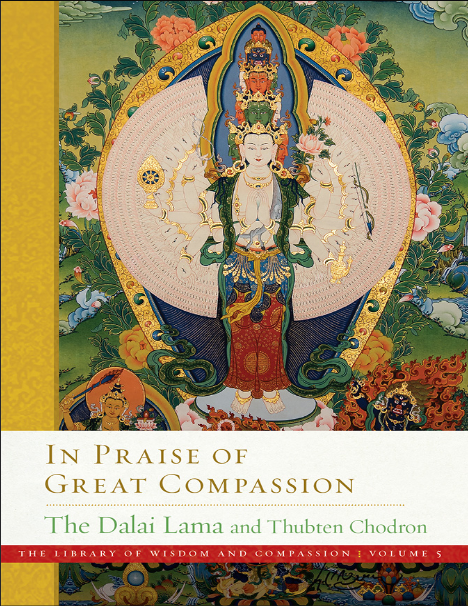Newly released
This book is new and will be uploaded as soon as it becomes available to us and if we secure the necessary publishing rights.

In Praise of Great Compassion Book PDF
(0)
Author:
Dalai LamaNumber Of Reads:
81
Language:
English
Category:
ReligionsSection:
Pages:
510
Quality:
excellent
Views:
768
Quate
Review
Save
Share
Book Description
The fifth volume of the Dalai Lama’s definitive Library of Wisdom and Compassion series, which has sold nearly 15,000 copies to date.
In Praise of Great Compassion, the fifth volume of the Library of Wisdom and Compassion, continues the Dalai Lama’s teachings on the path to awakening. While previous volumes focused on our present situation and taking responsibility for creating the causes for the happiness we seek, this volume is about opening our hearts to others and generating the compassion, joy, and fortitude to make our lives meaningful by benefiting them.
We are embedded in a universe with other beings, all of whom have been kind to us in one way or another. More than any other time in human history, we depend on one another to stay alive and flourish. We are sometimes oblivious to their kindness, or take it for granted, which leads to feelings of discontent. But when we look closely, it becomes apparent that we have been the recipient of great kindness and naturally we want to repay it.
To do this, we begin by cultivating a positive attitude toward others by contemplating the four immeasurables—immeasurable love, compassion, empathic joy, and equanimity—and the altruistic intention of bodhicitta. We learn to challenge the deluded logic of the self-centered attitude that leads to misery and replace it with a more realistic perspective that helps us to remain balanced when we experience either happiness or suffering. This enables us to make all circumstances favorable to the path to awakening.
Dalai Lama
The Dalai Lama is the supreme religious leader of Tibetan Buddhists and until 1959 AD, the Dalai Lama represented the spiritual and worldly leadership in Tibet.
He is, of course, a Buddhist monk of the Gelugpa group, which was founded by Tsongkhapa (1357-1419).
The title of King of Tibet and the successor of Buddha in the eyes of his followers. The last to hold this title was the 14th Dalai Lama, born in Shanghai in 1935, when he was four years old when a group of lamas considered him to be the successor to the 13th Dalai Lama. It was then erected in Lhasa in 1940 and came to be considered a "living Buddha".
He was a pacifist. He won the Nobel Peace Prize in 1989 for his peaceful struggle for the liberation of Tibet. He has consistently advocated nonviolent policies, even in the face of extreme aggression. He also became the first Nobel Prize winner to be honored for his interest in global environmental problems.
Book Currently Unavailable
This book is currently unavailable for publication. We obtained it under a Creative Commons license, but the author or publisher has not granted permission to publish it.
Rate Now
5 Stars
4 Stars
3 Stars
2 Stars
1 Stars
In Praise of Great Compassion Quotes
Top Rated
Latest
Quate
Be the first to leave a quote and earn 10 points
instead of 3
Comments
Be the first to leave a comment and earn 5 points
instead of 3